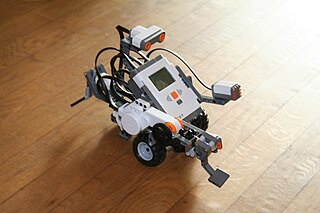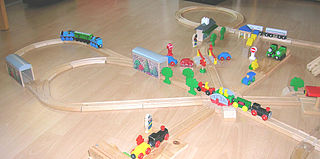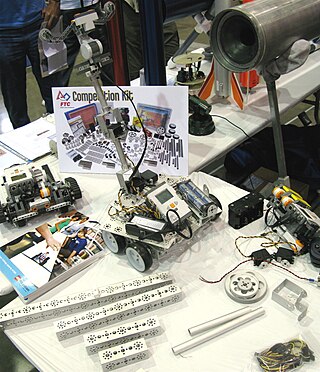
A robot is a machine—especially one programmable by a computer—capable of carrying out a complex series of actions automatically. A robot can be guided by an external control device, or the control may be embedded within. Robots may be constructed to evoke human form, but most robots are task-performing machines, designed with an emphasis on stark functionality, rather than expressive aesthetics.

Modular synthesizers are synthesizers composed of separate modules for different functions. The modules can be connected together by the user to create a patch. The outputs from the modules may include audio signals, analog control voltages, or digital signals for logic or timing conditions. Typical modules are voltage-controlled oscillators, voltage-controlled filters, voltage-controlled amplifiers and envelope generators.

Lego Mindstorms is a discontinued line of educational kits for building programmable robots based on Lego bricks.
Broadly speaking, modularity is the degree to which a system's components may be separated and recombined, often with the benefit of flexibility and variety in use. The concept of modularity is used primarily to reduce complexity by breaking a system into varying degrees of interdependence and independence across and "hide the complexity of each part behind an abstraction and interface". However, the concept of modularity can be extended to multiple disciplines, each with their own nuances. Despite these nuances, consistent themes concerning modular systems can be identified.
Modular programming is a software design technique that emphasizes separating the functionality of a program into independent, interchangeable modules, such that each contains everything necessary to execute only one aspect of the desired functionality.

Kid Spark Education is a nonprofit organization that develops and produces affordable Mobile STEM Labs and curriculum for Schools and Youth Service Organizations. The Rokenbok Toy Company was founded in 1995 by Paul Eichen in the United States to create an heirloom quality toy system. The first Rokenbok toys debuted at the 1997 American International Toy Fair in New York City. In 2010 the company made a substantial push researching the effect of media, like Rokenbok, on developing minds. In 2015 the company transitioned into a 501(c)(3) and completed the development of their first 4 classroom specific products called Mobile STEM Labs. Since then, Kid Spark Education has placed Mobile STEM Labs in over 22 states across the country.

Fischertechnik is a brand of construction toy. It was invented by Artur Fischer and is produced by fischertechnik GmbH in Waldachtal, Germany. Fans often refer to Fischertechnik as "FT" or "ft". It is used in education for teaching about simple machines, as well as motorization and mechanisms. The company also offers computer interface technology, which can be used to teach the theory of automation and robotics.

A robot kit is a special construction kit for building robots, especially autonomous mobile robots.
Modular self-reconfiguring robotic systems or self-reconfigurable modular robots are autonomous kinematic machines with variable morphology. Beyond conventional actuation, sensing and control typically found in fixed-morphology robots, self-reconfiguring robots are also able to deliberately change their own shape by rearranging the connectivity of their parts, in order to adapt to new circumstances, perform new tasks, or recover from damage.

Wooden toy trains are toy trains that run on a wooden track system with grooves to guide the wheels of the rolling stock. While the trains, tracks and scenery accessories are made mainly of wood, the engines and cars connect to each other using metal hooks or small magnets, and some use plastic wheels mounted on metal axles. Some trains are made to resemble anthropomorphical, fictional, and prototypical railroad equipment.
Adaptable Robotics refers to a field of robotics with a focus on creating robotic systems capable of adjusting their hardware and software components to perform a wide range of tasks while adapting to varying environments. The 1960s introduced robotics into the industrial field. Since then, the need to make robots with new forms of actuation, adaptability, sensing and perception, and even the ability to learn stemmed the field of adaptable robotics. Significant developments such as the PUMA robot, manipulation research, soft robotics, swarm robotics, AI, cobots, bio-inspired approaches, and more ongoing research have advanced the adaptable robotics field tremendously. Adaptable robots are usually associated with their development kit, typically used to create autonomous mobile robots. In some cases, an adaptable kit will still be functional even when certain components break.

Educational toys are objects of play, generally designed for children, which are expected to stimulate learning. They are often intended to meet an educational purpose such as helping a child develop a particular skill or teaching a child about a particular subject. They often simplify, miniaturize, or even model activities and objects used by adults.

TETRIX Robotics consists of two robotic kits by Pitsco Education. The two sets are the TETRIX MAX building system and the TETRIX PRIME building system. They are intended to be used as educational robotics and for competitions such as the FIRST Tech Challenge.
The modular optoelectronic multispectral scanner (MOMS) is a scanning system for spaceborne, geoscientific remote sensing applications used in satellite navigation systems for sensing atmospheric and oceanic systems. The scanner is combination of separate spectrometer blocks.
Sphero, Inc. is an American consumer robotics and toy company based in Boulder, Colorado.

littleBits is a New York City-based startup that makes an open source library of modular electronics, which snap together with small magnets for prototyping and learning. The company's goal is to democratize hardware the way software and printing have been democratized. The littleBits mission is to "put the power of electronics in the hands of everyone, and to break down complex technologies so that anyone can build, prototype, and invent." littleBits units are available in more than 70 countries and used in more than 2,000 schools. The company was named to CNN's 10 Startups to Watch for 2013.

Eurorack is a modular synthesizer format originally specified in 1995 by Doepfer Musikelektronik. It has since grown in popularity, and as of 2022 has become a dominant hardware modular synthesizer format, with over 15,000 modules available from more than 1000 different manufacturers ranging from DIY kits and boutique, cottage-industry designers to well-known, established synth mass-manufacturers like Moog and Roland.

Nintendo Labo is a toys-to-life concept developed by Nintendo and released in April 2018. Labo consists of 2 parts, where one part is a game and one part is multiple sheets of cardboard. The games come as kits that include cardboard cut-outs and other materials that are to be assembled in combination with the Nintendo Switch console display and Joy-Con controllers to create a "Toy-Con" that can interact with the included game software and vice versa. Nintendo designed Labo as a way to teach principles of engineering and basic programming.

The littleBits Synth Kit is an analogue modular synthesiser developed by the American electronics startup littleBits in collaboration with the Japanese music technology company Korg. Released in late 2013 after a design process of around nine months, the kit features 12 small modules that can be connected to form larger circuits. Several of these bits are adapted from circuits used in Korg's Monotron synthesisers. A booklet detailing over 10 example projects to follow is sold with the kit. A later version of the Synth Kit, the Synth Pro Kit, was released in June 2015 and added three new bits that provide external connectivity for the kit.















